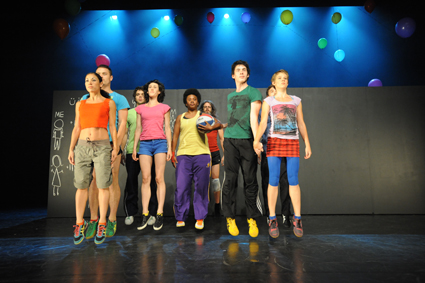Happiness against the odds
Kaye Hall: Shaun Parker & Company, Happy as Larry

Happy as Larry, Shaun Parker
courtesy the artist
Happy as Larry, Shaun Parker
Beneath a balloon-filled stage, a large black box serves as backdrop, blackboard, springboard and backstage for Happy As Larry (set design by Adam Gardnir), a dynamic urban dance piece from Australian choreographer Shaun Parker and his company exploring the nature of happiness.
The box provided more than a few surprises as the cast slouched against, hung from and sprang from its sides, performing a mix of modern dance, breakdance and acrobatics. Revolving on rollers, changing scenes, taking dancers with it, revealing others, the box also rolled backwards, making space for extended dance numbers. At one point it span at high speed, adding to the momentum of a rollerskater racing around in the opposite direction. Dancers disappeared inside, sat atop and leapt over it. One of the highlights was watching the whole cast parkour over the top, making increasingly daring dismounts. It also served as a blackboard and, as the show progressed, a touching dialogue in chalk was established between one character (The Observer), the rest of the cast and the audience.
According to the program, “the cast of characters is developed from the Enneagram, a psychological system that maps nine personality types” (program notes). I found myself focused on the Observer (Timothy Ohl). I enjoyed seeing him irresistibly drawn into the dance and communicating his thoughts and feelings on the board. In one scene he danced with the chalk, making marks in time with the music, articulating it beautifully in arcs, waves and lines: high, low, flowing, sharp, flat, round. This scene allowed time to dwell on the work of composers Nick Wales and Bree Van Reyk, whose electroacoustic soundtrack reflected the personalities on stage and the full spectrum of emotion in the dancing.
Wearing simple, coloured street clothes, the cast (six men and two women) danced their way into our hearts, jiving and diving below the surface, tapping into emotion and experience that clearly resonated with the audience. As they searched for happiness, we felt their hope, disappointment and sadness, but above all Happy as Larry made me smile: The Perfectionist, a fitness fanatic who would not be distracted by The Tragic Romantic; the Performer who exhausted himself winning the applause of others; the Optimist learning to skate. I enjoyed the headstands and the clowning— the playfulness of the piece.
Although intermittently drawn into the fun, the Observer remains the outcast. We receive a dramatic ‘wake up call’ when his inner torment turns suicidal and he shoots himself in the face with blue chalk. However, quick changes don’t allow us to dwell on any one moment in Happy As Larry, perhaps pointing to the transient nature of emotion, or the elusiveness of happiness itself. As the Observer writhes on the ground, the stage revolves, this ominous scene replaced by a giant ghetto blaster (drawn on the blackboard) setting the stage for the final ensemble piece.
Lighting designer Luis Pampolha uses simple combinations to illuminate the mood: blue, diffuse—sad; white, bright—happy; and a spotlight for intensity. Yellow highlighted the blackboard and its tape play button that triggered the grand finale. The cast ‘took it out,’ mixing sweat and chalk in one last explosion of physicality: catching each other, collapsing, loose, dependent, one by one disappearing behind the box…leaving the Observer to trace his lines on the board.
In the final scene, as the Observer reflects on his experience, a viola plays and the balloons begin to lower, dragging him down with them, until he’s cross-legged on the floor. With a click of his fingers they shoot back into the air. Such is life, Parker seems to be saying; happiness turns on a dime.






